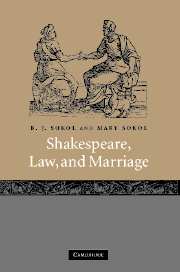Book contents
- Frontmatter
- Contents
- Acknowledgments
- List of abbreviations: Shakespeare titles
- Introduction
- 1 Making a valid marriage: the consensual model
- 2 Arranging marriages
- 3 Wardship and marriages enforced by law
- 4 Financing a marriage: provision of dowries or marriage portions
- 5 The solemnisation of marriage
- 6 Clandestine marriage, elopement, abduction, and rape: irregular marriage formation
- 7 The effects of marriage on legal status
- 8 Marriage breakdown: separation, divorce, illegitimacy
- 9 'Til death us do part
- An afterword on method
- Notes
- Bibliography
- Index
9 - 'Til death us do part
Published online by Cambridge University Press: 22 September 2009
- Frontmatter
- Contents
- Acknowledgments
- List of abbreviations: Shakespeare titles
- Introduction
- 1 Making a valid marriage: the consensual model
- 2 Arranging marriages
- 3 Wardship and marriages enforced by law
- 4 Financing a marriage: provision of dowries or marriage portions
- 5 The solemnisation of marriage
- 6 Clandestine marriage, elopement, abduction, and rape: irregular marriage formation
- 7 The effects of marriage on legal status
- 8 Marriage breakdown: separation, divorce, illegitimacy
- 9 'Til death us do part
- An afterword on method
- Notes
- Bibliography
- Index
Summary
OVERVIEW
The title of this chapter, taken from the Prayer Book marriage service, was a phrase sadly apposite to family life in Shakespeare's England. The demographic facts meant that children were often orphaned and that widows and widowers were familiar figures, as were step-parents and step-brothers and step-sisters.
The emotional impact of the early deaths of many early modern parents and children has been much debated by historians. But, whatever can be concluded about the emotional effects on families of deaths, it is certain that the death of a wife or husband had very considerable legal implications for the surviving spouse and any children. These implications fall into three main categories, which are changes of status, inheritance, and provisions for widowhood.
Changes in survivors' legal status following the end of a marriage include that under certain circumstances male or female children who lost a father might have become wards, as we have seen in chapter 3. In this present chapter our chief concern will be with the changed status of surviving male or female spouses.
We will then consider the effects of the ending of a marriage in death on matters of money or property, first in the operation of the laws of inheritance and wills, and then in the consequences of curtesy, dower, or jointure rights.
Legal and social issues arising from death in families had a significant impact on the structures and the meanings of a wide range of Shakespeare's plays.
- Type
- Chapter
- Information
- Shakespeare, Law, and Marriage , pp. 164 - 184Publisher: Cambridge University PressPrint publication year: 2003

